Opening Night | Clarinet + Strings
After hearing Mozart's magnificent clarinet quintet, Johannes Brahms exited retirement to pen his own take on the unique instrument combination of clarinet and string quartet. Hear both pieces featuring clarinetist José Franch-Ballester.

Featured Artists
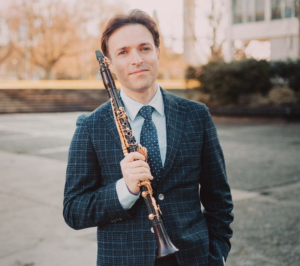 Clarinetist Jose Franch-Ballester is a captivating performer of “poetic eloquence” (The New York Sun) and “technical wizardry” (The New York Times). He plays regularly at the Bridgehampton Chamber Music Festival, Chamber Music Northwest, the Saratoga Chamber Music Festival, the Skaneateles Festival, Camerata Pacifica, and Music from Angel Fire. He has also appeared at the Usedomer Musikfestival in Germany, the Verbier Festival in Switzerland, the Cartagena Festival Internacional de Música in Colombia, and the Young Concert Artists Festival in Tokyo, Japan. As a soloist, he has appeared with the Orchestra of St. Luke’s, the BBC Concert Orchestra, the Santa Barbara Orchestra, and numerous Spanish orchestras. Winner of the 2004 Young Concert Artists International Auditions, he was presented in debut recitals in New York and in Washington, DC at the Kennedy Center. In 2008, he won a coveted Avery Fisher Career Grant. He was awarded the Cannes’ Midem Prize, which aims to introduce artists to the classical recording industry. With the Chamber Music Society, he has recorded Bartók’s Contrasts on the Deutsche Grammophon label. Born in Moncofa, Spain into a family of clarinetists and Zarzuela singers, Mr. Franch-Ballester graduated from the Joaquin Rodrigo Music Conservatory. He earned a bachelor’s degree from The Curtis Institute of Music, where he studied with Donald Montanaro and Pamela Frank.
Clarinetist Jose Franch-Ballester is a captivating performer of “poetic eloquence” (The New York Sun) and “technical wizardry” (The New York Times). He plays regularly at the Bridgehampton Chamber Music Festival, Chamber Music Northwest, the Saratoga Chamber Music Festival, the Skaneateles Festival, Camerata Pacifica, and Music from Angel Fire. He has also appeared at the Usedomer Musikfestival in Germany, the Verbier Festival in Switzerland, the Cartagena Festival Internacional de Música in Colombia, and the Young Concert Artists Festival in Tokyo, Japan. As a soloist, he has appeared with the Orchestra of St. Luke’s, the BBC Concert Orchestra, the Santa Barbara Orchestra, and numerous Spanish orchestras. Winner of the 2004 Young Concert Artists International Auditions, he was presented in debut recitals in New York and in Washington, DC at the Kennedy Center. In 2008, he won a coveted Avery Fisher Career Grant. He was awarded the Cannes’ Midem Prize, which aims to introduce artists to the classical recording industry. With the Chamber Music Society, he has recorded Bartók’s Contrasts on the Deutsche Grammophon label. Born in Moncofa, Spain into a family of clarinetists and Zarzuela singers, Mr. Franch-Ballester graduated from the Joaquin Rodrigo Music Conservatory. He earned a bachelor’s degree from The Curtis Institute of Music, where he studied with Donald Montanaro and Pamela Frank.
 Two-time GRAMMY nominee and Avery Fisher career grant recipient violinist Jennifer Frautschi has appeared as soloist with innumerable orchestras including the Cincinnati Symphony, Chicago Symphony, Los Angeles Philharmonic, and Milwaukee Symphony. As chamber musician she has performed with the Boston Chamber Music Society and Chamber Music Society of Lincoln Center and appeared at Chamber Music Northwest, La Jolla Summerfest, Music@Menlo, and many others.
Two-time GRAMMY nominee and Avery Fisher career grant recipient violinist Jennifer Frautschi has appeared as soloist with innumerable orchestras including the Cincinnati Symphony, Chicago Symphony, Los Angeles Philharmonic, and Milwaukee Symphony. As chamber musician she has performed with the Boston Chamber Music Society and Chamber Music Society of Lincoln Center and appeared at Chamber Music Northwest, La Jolla Summerfest, Music@Menlo, and many others.
Her extensive discography includes several discs for Naxos including the Stravinsky Violin Concerto with the Philharmonia Orchestra of London and two GRAMMY-nominated recordings with the Fred Sherry Quartet. She also recorded widely praised CDs featuring 20th-century works for solo violin with Gerard Schwarz and the Seattle Symphony.
Ms. Frautschi attended the Colburn School, Harvard, the New England Conservatory, and the Juilliard School. She performs on a 1722 Stradivarius violin, “ex-Cadiz,” on loan with support from Rare Violins In Consortium. She teaches in the graduate program at Stony Brook University.
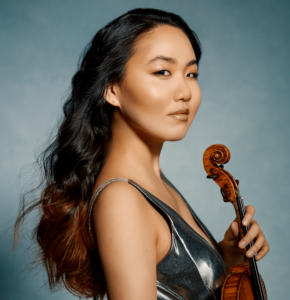 The recipient of a 2020 Avery Fisher Career Grant, American violinist Stella Chen has been lauded for her “phenomenal maturity” and “fresh and spontaneous, yet emotionally profound and intellectually well-structured performance” (The Jerusalem Post). She is the grand prize winner of the 2019 International Queen Elisabeth International Violin Competition and the youngest ever winner of the Menuhin Competition.
The recipient of a 2020 Avery Fisher Career Grant, American violinist Stella Chen has been lauded for her “phenomenal maturity” and “fresh and spontaneous, yet emotionally profound and intellectually well-structured performance” (The Jerusalem Post). She is the grand prize winner of the 2019 International Queen Elisabeth International Violin Competition and the youngest ever winner of the Menuhin Competition.
Recent solo appearances include numerous orchestras including the Belgian National Orchestra, Brussels Philharmonic, Luxembourg Philharmonia, and London Chamber Orchestra. Stella has appeared at chamber music festivals including Music@Menlo, Sarasota Music Festival, and YellowBarn, and has collaborated with such notable artists as Itzhak Perlman, Robert Levin, and the Silk Road Ensemble.
A graduate of the Harvard/New England Conservatory Dual Degree Program, Stella received a Bachelor of Arts in psychology with honors from Harvard University and an MM from NEC. She plays the ‘Huggins’ 1708 Stradivarius violin, on loan from the Nippon Music Foundation.
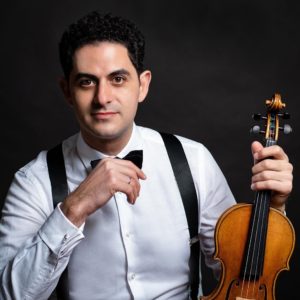 Winner of a 2009 Avery Fisher Career Grant, Arnaud Sussmann has distinguished himself with his unique sound, bravura, and profound musicianship. Minnesota’s Pioneer Press writes, “Sussmann has an old-school sound reminiscent of vintage recordings by Jascha Heifetz or Fritz Kreisler, a rare combination of sweet and smooth that can hypnotize a listener.”
Winner of a 2009 Avery Fisher Career Grant, Arnaud Sussmann has distinguished himself with his unique sound, bravura, and profound musicianship. Minnesota’s Pioneer Press writes, “Sussmann has an old-school sound reminiscent of vintage recordings by Jascha Heifetz or Fritz Kreisler, a rare combination of sweet and smooth that can hypnotize a listener.”
Mr. Sussmann he has recently appeared as a soloist with the Mariinsky Orchestra under Valery Gergiev, and the Vancouver, and New World Symphonies. As a chamber musician, he has performed at the Tel Aviv Museum, London’s Wigmore Hall, Lincoln Center, and the White Nights Festival in Saint Petersburg. He has also given concerts at the Caramoor, Music@Menlo, La Jolla SummerFest, Mainly Mozart, and Seattle Chamber Music festivals, collaborating with many of today’s leading artists including Itzhak Perlman, Shmuel Ashkenasi, Wu Han, David Finckel, and Jan Vogler.
Sussmann is Artistic Director of the Chamber Music Society of Palm Beach, Co-Director of Music@Menlo’s International Program, and teaches at Stony Brook University.
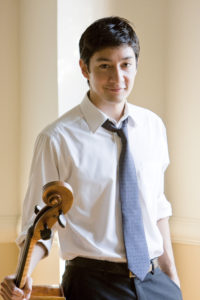 First prize winner of the 2008 Naumburg International Violoncello Competition, David Requiro (pronounced re-KEER-oh) has emerged as one of today’s finest American cellists. Mr. Requiro has made concerto appearances with the National Symphony Orchestra, Seattle Symphony, Tokyo Philharmonic, and many California orchestras including the Oakland, Santa Cruz, and Santa Rosa Symphonies. Actively involved in contemporary music, Mr. Requiro appeared as a guest artist at the 2010 Amsterdam Cello Biennale.
First prize winner of the 2008 Naumburg International Violoncello Competition, David Requiro (pronounced re-KEER-oh) has emerged as one of today’s finest American cellists. Mr. Requiro has made concerto appearances with the National Symphony Orchestra, Seattle Symphony, Tokyo Philharmonic, and many California orchestras including the Oakland, Santa Cruz, and Santa Rosa Symphonies. Actively involved in contemporary music, Mr. Requiro appeared as a guest artist at the 2010 Amsterdam Cello Biennale.
An avid chamber musician, Mr. Requiro is a founding member of the Baumer String Quartet and frequently performs with the Chamber Music Society of Lincoln Center, Takács String Quartet, Seattle Chamber Music Society, Concertante Chamber Players, ECCO (East Coast Chamber Orchestra), and the Alexander String Quartet. Mr. Requiro is Assistant Professor at the University of Colorado Boulder. His artist faculty appointments include the Music@Menlo Festival, Bowdoin International Music Festival, Seattle Chamber Music Society Summer Festival, and others. Along with duo partner Meta Weiss, he co-founded the Boulder Cello Festival in 2020.
About The Music
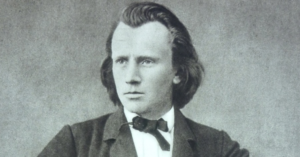 In 1890, and again in 1894, Johannes Brahms (1833-1897) announced his retirement from composition. Both times, he returned to create more music for one particular performer: clarinetist Richard Mühlfeld, from the court orchestra in Meiningen, Germany. After hearing Mühlfeld play in 1891, Brahms composed for the first time in a year, crafting both the Clarinet Trio (Opus 114) and the Clarinet Quintet (Opus 115) during his summer holiday in an Austrian spa town. Mühlfeld premiered both works that winter, joined by the string quartet led by Brahms’ longtime friend Joseph Joachim.
In 1890, and again in 1894, Johannes Brahms (1833-1897) announced his retirement from composition. Both times, he returned to create more music for one particular performer: clarinetist Richard Mühlfeld, from the court orchestra in Meiningen, Germany. After hearing Mühlfeld play in 1891, Brahms composed for the first time in a year, crafting both the Clarinet Trio (Opus 114) and the Clarinet Quintet (Opus 115) during his summer holiday in an Austrian spa town. Mühlfeld premiered both works that winter, joined by the string quartet led by Brahms’ longtime friend Joseph Joachim.
Brahms’ model for the Clarinet Quintet was a work that Mozart composed for the same ensemble in 1789. It may just be coincidence that these two composers gravitated toward the clarinet in their final years, but it is hard not to project some amount of wistful, nostalgic autobiography onto their autumnal masterpieces.
There is indeed a bittersweet quality to Brahms’ Clarinet Quintet, much of it generated by the continual pull of the listener’s expectations between major and minor tonalities. The first movement begins with sweetness, as the violins twine together in thirds; at this point, the ear perceives the key as D-major. minute passes before the harmony lands with any real force on the actual home key of B-minor, and soon enough it leaves again for D-major, the setting of the secondary theme. Those two keys are flip sides of the same coin, sharing all the same scale tones, and the movement continually flips
that coin such that we bounce from the hopefulness of the major key to the heaviness of the minor. This conflict continues throughout the quintet, like when the slow movement in the key of B-major drops into a contrasting passage in B-minor tinged with “Gypsy” flair. The reverse transpires in the theme-and-variations finale, which dangles a possible resolution in B-major before arriving definitively in B-minor.
Notes by Aaron Grad
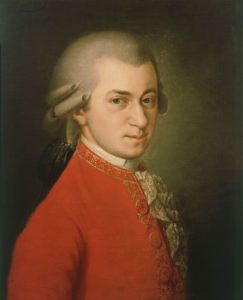 The music that Wolfgang Amadeus Mozart wrote for his friend and fellow freemason Anton Stadler played no small part in elevating the clarinet to the indispensable concert instrument it is today. Until the eighteenth century, the closest precursor was the cylindrical, single-reed woodwind known as the chalumeau that had open finger holes like a recorder and which only played in a compressed, lower register. The advent of a register key opened access to the instrument’s upper range, which offered a bright tone not unlike a trumpet, or clarino in Italian—hence the diminutive clarinetto, rendered in English as clarinet. Through his friendship with Stadler, Mozart came to write a trio in 1786 for the novel combination of clarinet, viola and piano (the so-called “Kegelstatt” Trio). The Clarinet Quintet followed in 1789, scored for two violins, viola, cello and basset clarinet, an instrument designed by Stadler with an extended low range. The Clarinet Concerto that Mozart wrote just two months before he died in 1791 also featured Stadler and his basset clarinet.
The music that Wolfgang Amadeus Mozart wrote for his friend and fellow freemason Anton Stadler played no small part in elevating the clarinet to the indispensable concert instrument it is today. Until the eighteenth century, the closest precursor was the cylindrical, single-reed woodwind known as the chalumeau that had open finger holes like a recorder and which only played in a compressed, lower register. The advent of a register key opened access to the instrument’s upper range, which offered a bright tone not unlike a trumpet, or clarino in Italian—hence the diminutive clarinetto, rendered in English as clarinet. Through his friendship with Stadler, Mozart came to write a trio in 1786 for the novel combination of clarinet, viola and piano (the so-called “Kegelstatt” Trio). The Clarinet Quintet followed in 1789, scored for two violins, viola, cello and basset clarinet, an instrument designed by Stadler with an extended low range. The Clarinet Concerto that Mozart wrote just two months before he died in 1791 also featured Stadler and his basset clarinet.
Despite Stadler’s advocacy, his basset clarinet design died out, and most performers today perform the Clarinet Quintet on a modern clarinet, adjusting a few low notes as needed. The instrument’s wide range is on display from the outset, when it enters with rising and falling arpeggios in response to a smooth string chorale to start the first movement. The Larghetto emphasizes the voice-like quality of the clarinet’s sweet soprano range, while the Menuetto shows off the instrument’s fluid, graceful slurs. The finale begins with a simple, bouncing theme that would not sound out of place on a children’s playground, setting up a flashy series of variations.
Notes by Aaron Grad
CMSPB does not discriminate on the basis of race, gender, creed, ethnicity, religion, sexual orientation, age or disability and we are a 501(c)(3) nonprofit organization.
Site maintained by Teller | © 2020-2022 Chamber Music Society of Palm Beach | All rights reserved.
